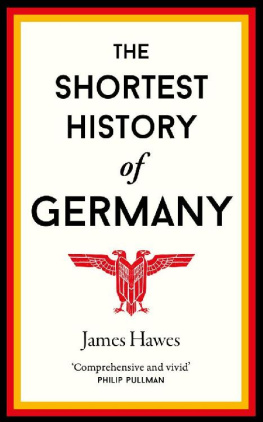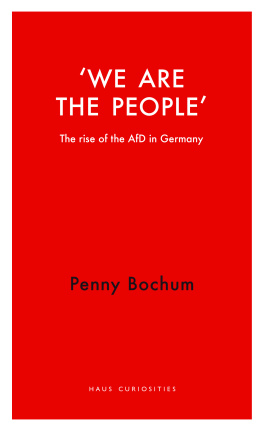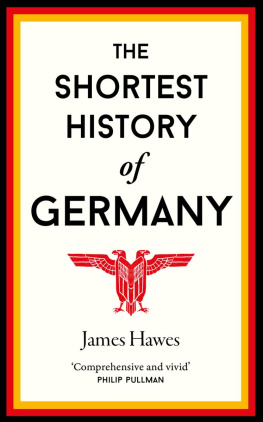Around 500 BC , at our best guess, in a collection of Iron Age huts in southern Scandinavia or northernmost Germany, one branch of the Indo-European population of Europe began to pronounce certain consonants differently from everyone else.

Where it probably started, c. 500 BC
Exactly who and where and when and why, nobody knows for sure, or ever can. We can, though, reconstruct what happened. Take those question-words. Other languages went on using a c/k/qu sound (as in the Latin quis, quid, quo, cur, quam) and still do today (quoi, que, che, kakiya and so on); but the ancestor of Danish, English, German and suchlike now peeled off and started using a hv/wh/h sound, leading to the modern hvad/what/was and so on.
| The First Germanic Sound-Shift is also known as Grimms Law because it was set down by Jacob, elder of the folktale-collecting Brothers Grimm. Its effect can most clearly be seen in modern English, which uses both Germanic and non-Germanic, Latin-derived versions. |
| p became f: paternal fatherly |
| f became b: fraternal brotherly |
| b became p: labia lip |
| c/k/qu became hv/wh/h: century hundred |
| h became g: horticulture gardening |
| g became k: gnostic know |
| t became th: triple three |
| d became t: dental teeth |
The tribes who (we deduce) started using these new sounds in about 500 BC are known as the proto-Germans. We have no idea what they called themselves, because at this stage they had no contact whatever with the peoples of the Mediterranean, who had things like aqueducts, libraries, theatres, elections and written history.
We do know that by about 150 BC , the proto-Germans had started interacting with the Mediterranean world. From this period, Roman-made wine-drinking sets start turning up all over Germany. We also know that shopping was a new experience for them, because in all Germanic languages, the word for buying things (kaupa/kopen/shopping/kaufen etc) is taken straight from the Latin word caupo, which means small trader or innkeeper. We can imagine First Contact taking place in some trading-post on the Rhine or the Danube, where the proto-German elite exchanged furs, amber, their blond hair (prized by Roman wig-makers) and above all slaves, for drink.
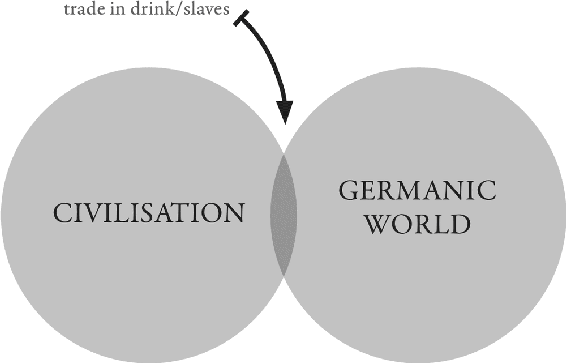
This trade seems to have continued peacefully until some tribes from the north called the Cimbri and Teutones gave the Roman Republic a mortal scare from 112 BC until 101 BC , when they were finally wiped out by the great general Marius. Later patriots would claim them as early Germans, but to the Romans they were just generic barbarians. Certainly, no one ever called them Germans at the time. In fact, as far as we know, no one ever called anyone a German until 58 BC . Fittingly, the whole grand story starts with one of the most famous men in history.
The Romans create the Germans, then the Germans take over Rome
Caesar invents the Germans
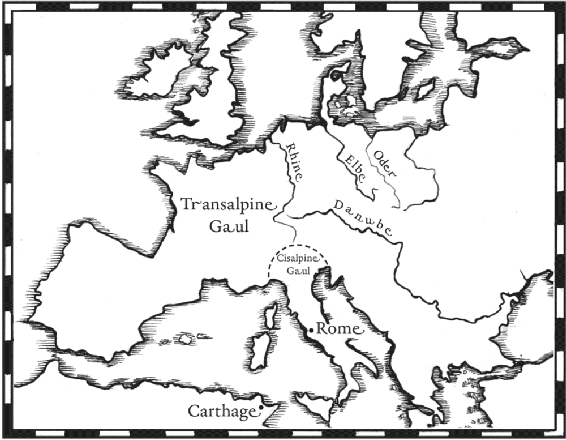
Rome and Gaul before Caesar
In March 60 BC , the main topic of conversation in Rome (wrote the philosopher-lawyer-politician Cicero) was the threat of barbarian asylum-seekers. They were flooding into the already Romanised area of Cisalpine Gaul in essence, todays northern Italy because of unrest and wars further north. There seemed to be a new and troublesome power in unconquered Transalpine Gaul. In 58 BC , Julius Caesar, the new governor of Cisalpine Gaul, itching for a war of conquest to make his reputation and clear his debts, gave them a name: Germani.
From the first mention on page one of his bestselling history, the Gallic War, Caesar firmly pairs these Germani with the idea that they dwell beyond the Rhine. He is filling in a map as blank for his own readership as Central Africa was for Stanleys, and he gets his big idea in straight away. Rome and Gaul overlap, both physically and culturally, but beyond the Rhine lies a completely different nation. This is hammered home throughout the pages of the Gallic War.
Caesar soon discovers that things are indeed looking bad. Some Gaulish tribes had bribed 15,000 fighting Germans across the Rhine to help them against the domineering Aedui. But having won the day, the German leader, Ariovistus, called more of his people across the Rhine and is now

